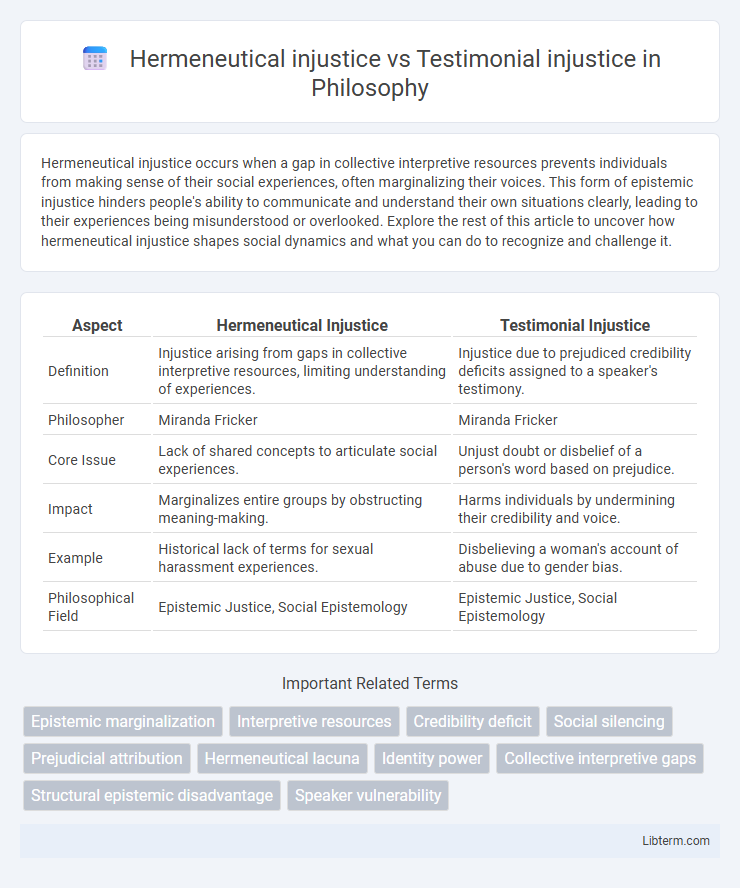Hermeneutical injustice occurs when a gap in collective interpretive resources prevents individuals from making sense of their social experiences, often marginalizing their voices. This form of epistemic injustice hinders people's ability to communicate and understand their own situations clearly, leading to their experiences being misunderstood or overlooked. Explore the rest of this article to uncover how hermeneutical injustice shapes social dynamics and what you can do to recognize and challenge it.
Table of Comparison
| Aspect | Hermeneutical Injustice | Testimonial Injustice |
|---|---|---|
| Definition | Injustice arising from gaps in collective interpretive resources, limiting understanding of experiences. | Injustice due to prejudiced credibility deficits assigned to a speaker's testimony. |
| Philosopher | Miranda Fricker | Miranda Fricker |
| Core Issue | Lack of shared concepts to articulate social experiences. | Unjust doubt or disbelief of a person's word based on prejudice. |
| Impact | Marginalizes entire groups by obstructing meaning-making. | Harms individuals by undermining their credibility and voice. |
| Example | Historical lack of terms for sexual harassment experiences. | Disbelieving a woman's account of abuse due to gender bias. |
| Philosophical Field | Epistemic Justice, Social Epistemology | Epistemic Justice, Social Epistemology |
Introduction to Epistemic Injustice
Hermeneutical injustice occurs when marginalized groups lack the collective interpretive resources to make sense of their social experiences, leading to a gap in shared understanding. Testimonial injustice involves the unfair deflation of a speaker's credibility due to prejudice, causing their knowledge or testimony to be discredited. Both forms of epistemic injustice undermine the equitable distribution of knowledge and the recognition of diverse perspectives in epistemic communities.
Defining Hermeneutical Injustice
Hermeneutical injustice occurs when a gap in collective interpretive resources prevents individuals from making sense of their social experiences, resulting in their marginalization. Unlike testimonial injustice, which involves a credibility deficit heard by others when individuals provide knowledge, hermeneutical injustice is rooted in structural inequalities that obscure or distort understanding. This form of injustice undermines the ability of marginalized groups to articulate and share their lived realities effectively.
Understanding Testimonial Injustice
Testimonial injustice occurs when a speaker's credibility is unfairly deflated due to prejudice, resulting in their testimony being unjustly disbelieved or undervalued. This form of injustice undermines the epistemic agency of marginalized individuals, impacting their ability to contribute knowledgefully in social interactions. Hermeneutical injustice differs by involving gaps in collective interpretive resources that hinder understanding marginalized experiences, while testimonial injustice centers on biases affecting trust in testimony.
Key Differences Between Hermeneutical and Testimonial Injustice
Hermeneutical injustice occurs when a gap in collective interpretive resources unfairly disadvantages a group in making sense of their social experiences, while testimonial injustice happens when prejudice leads to the credibility of a speaker being unjustly deflated. Key differences include the fact that hermeneutical injustice impacts understanding and meaning-making at a structural or societal level, whereas testimonial injustice directly affects interpersonal trust and the reception of individual testimony. Hermeneutical injustice often results in a lack of conceptual tools for expressing experiences, whereas testimonial injustice involves prejudicial credibility judgments against the speaker.
Historical Examples of Hermeneutical Injustice
Hermeneutical injustice occurs when marginalized groups lack the collective interpretive resources to make sense of their social experiences, as seen in the historical silencing of women during the suffrage movement, where their oppression was neither fully recognized nor articulated. Testimonial injustice involves prejudiced credibility deficits, such as the dismissal of African American witness testimonies during Jim Crow-era court trials. The historical exclusion of Indigenous peoples' spiritual practices from dominant religious frameworks exemplifies hermeneutical injustice by rendering their lived experiences conceptually invisible.
Real-World Cases of Testimonial Injustice
Testimonial injustice occurs when a speaker's credibility is unfairly deflated due to prejudice, often seen in real-world cases where marginalized groups' testimonies are dismissed or doubted, such as in legal trials involving racial minorities or victims of sexual assault. Hermeneutical injustice arises from a gap in collective understanding that leaves individuals unable to properly communicate their experiences, frequently affecting groups lacking social or cultural resources to make sense of systemic issues. High-profile instances of testimonial injustice highlight systemic biases that impede justice, underscoring the need for reforms in evidentiary standards and societal attitudes.
Impact on Marginalized Communities
Hermeneutical injustice occurs when marginalized communities lack the collective interpretive resources to make sense of their social experiences, resulting in systemic misunderstandings and silencing of their realities. Testimonial injustice involves undermining the credibility of individuals from marginalized groups, leading to distrust and exclusion in social and institutional contexts. Both forms of injustice perpetuate inequality by eroding the voices and epistemic agency of marginalized communities, hindering social recognition and justice.
The Role of Power and Social Structures
Hermeneutical injustice arises when marginalized groups lack the social power to shape interpretive frameworks, leading to collective gaps in understanding their own experiences. Testimonial injustice occurs when prejudicial power imbalances cause hearers to undervalue or dismiss the credibility of a speaker's knowledge. Both injustices reflect how dominant social structures and hierarchies influence whose voices are heard and which meanings are recognized in society.
Addressing and Redressing Epistemic Injustices
Addressing hermeneutical injustice requires creating inclusive interpretive frameworks that enable marginalized groups to articulate their experiences and improve collective understanding. Redressing testimonial injustice involves cultivating epistemic virtues such as open-mindedness and trustworthiness in testimonial exchanges, ensuring that marginalized voices are fairly heard and credited. Both forms of epistemic injustice demand institutional reforms and epistemic allyship to dismantle systemic barriers and foster epistemic equity.
Conclusion: Towards Epistemic Justice
Hermeneutical injustice occurs when gaps in collective understanding prevent individuals from making sense of their social experiences, while testimonial injustice arises from prejudice that undermines a speaker's credibility. Addressing both injustices requires cultivating inclusive epistemic environments that recognize diverse knowledge and lived experiences. Promoting epistemic justice involves dismantling systemic biases and empowering marginalized voices to contribute meaningfully to shared knowledge.
Hermeneutical injustice Infographic

 libterm.com
libterm.com